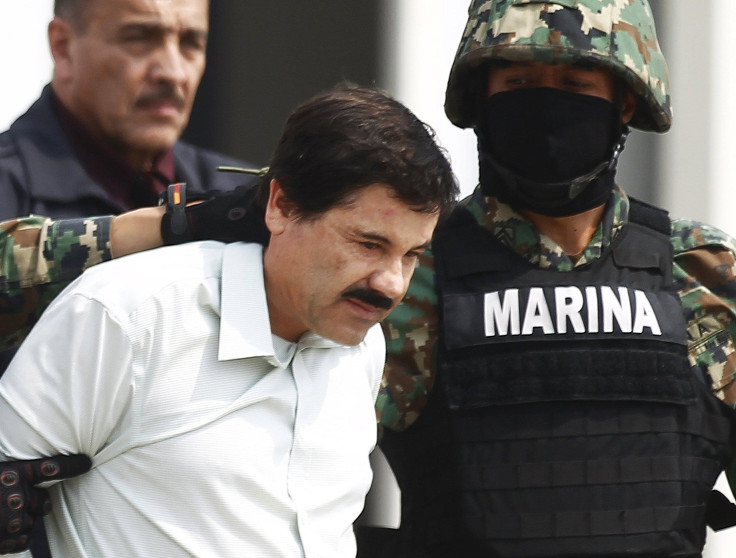Mexico Offers $3.8M Reward To Find 'El Chapo' Guzman, Sacks Police Officials; DEA Warned Of Escape In 2014

The Mexican government offered $3.8 million in reward to capture the Sinaloa drug cartel head Joaquin "El Chapo" Guzman and sacked police officials, suspected of helping him escape the high-security federal prison, according to reports on Tuesday. Guzman's escape from the prison, about 55 miles west of Mexico City, on Saturday after 17 months in custody triggered a massive manhunt.
Mexico's Interior Minister Miguel Angel Osorio Chong said, according to Agence France-Presse (AFP), that Guzman, who was wearing his monitoring bracelet when he escaped, must have "counted on the complicity of prison personnel ... which if confirmed would constitute an act of treason."
The latest escape, which is the second for Guzman, has become a major concern for President Enrique Pena Nieto's administration.
“Just like no resources were spared to detain this fugitive in the past, we will not spare any resource to detain him again,” Chong said, according to the New York Times, adding: “There will be no rest for this felon.”
Guzman was first arrested in 1993, but escaped from a high-security prison in Jalisco state in January 2001. In February 2014, he evaded arrest using a network of tunnels that connected several houses in Culiacan, Sinaloa state. However, he was arrested later that month.
"The spectacular escape adds to the Chapo Guzman legend," Mike Vigil, a retired chief of international operations at the U.S. Drug Enforcement Administration (DEA), said, according to AFP, adding: "He's very much liked by the members of the cartel and they will accept him very quickly with open arms."
A report by the Associated Press (AP) on Tuesday cited 2014 documents from the DEA, which showed that several family members and associates of Guzman were planning "potential operations to free Guzman." The DEA reportedly alerted the Mexican authorities 16 months ago about the formation of the plot. However, Chong denied DEA's assertions that it had already informed the Mexican authorities about the alleged plot.
Last March, DEA agents in Los Angeles reported about a possible escape operation funded by Rafael Caro-Quintero, who had helped plan the kidnapping and murder of DEA agent Enrique "Kiki" Camarena by threatening or bribing prison officials in 1985. The investigation later also revealed that Guzman’s son was bringing together lawyers and military counter-intelligence personnel to plan an escape.
"A deal was in place to release both Guzman-Loera (as identified in the DEA documents) and imprisoned Los Zetas Cartel leader Miguel Angel 'Z-40' Trevino-Morales," a Mexican army general said, according to the AP.
The DEA documents from 2014 also stated that Guzman was directing parts of his drug empire from the prison.
"Despite being imprisoned in a 'high security' facility, DEA reporting further indicates Guzman-Loera was able to provide direction to his son and other cartel members via the attorneys who visited (him) in prison and possibly through the use of a cellphone provided ... by corrupt prison guards," the AP reported, citing official documents.
Guzman's escape has highlighted corruption and the lack of law enforcement in the country, further blotting Nieto's political record.
“The supervision should have been very strict, given the profile and relevance for the Mexican government of this drug lord,” Eduardo Guerrero Gutiérrez, a security consultant and former intelligence official in Mexico, said, according to the Washington Post, adding: “They should do a complete cleaning of this prison staff. There was massive collusion.”
© Copyright IBTimes 2025. All rights reserved.






















